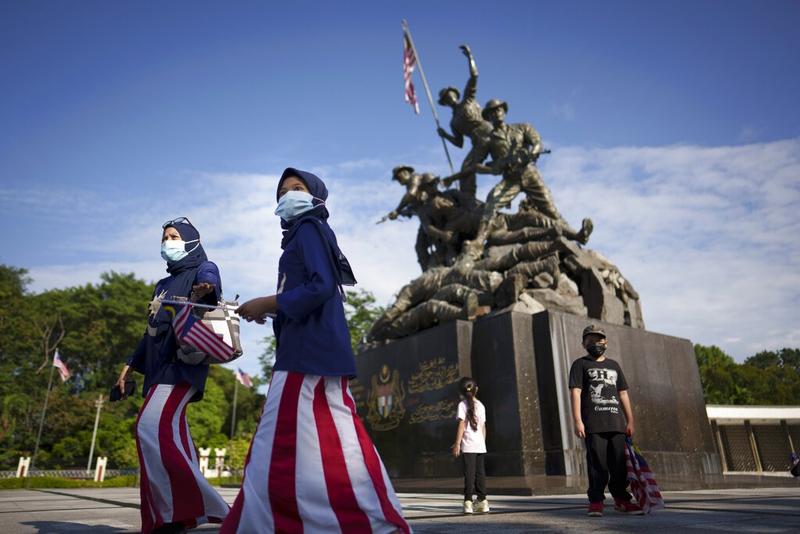 Muslim women wearing Malaysian national flag costumes walk in front of the National Monument during the 64th National Day celebrations to commemorate independence from British colonial rule, in Kuala Lumpur, Malaysia, Aug 31, 2021. (VINCENT THIAN / AP)
Muslim women wearing Malaysian national flag costumes walk in front of the National Monument during the 64th National Day celebrations to commemorate independence from British colonial rule, in Kuala Lumpur, Malaysia, Aug 31, 2021. (VINCENT THIAN / AP)
Malaysia has unveiled plans to reopen the resort island of Langkawi to domestic tourists from Sept 16, signaling the nation's resolve to gradually restore vigor to the travel sector and the wider economy.
In a message posted on social media, Prime Minister Ismail Sabri Yaakob said other destinations will be reopened as soon as vaccination rates in the localities hit 80 percent. He expects this target to be achieved within this month.
According to official data, 15.9 million Malaysians have been fully vaccinated as of Sunday. This is equivalent to nearly 70 percent of the national vaccination rate-one of the highest in the world.
Michael Jeyakumar Devaraj, co-convener of the alliance People's Health Forum, an alliance campaigning for healthcare reform, said maintaining a zero-case policy is no longer feasible for Malaysia as the coronavirus has "spread far and wide" within the country.
Devaraj said the country's financial resources and the government's competence have contributed to the success of the vaccination program.
"Malaysia is a high middle-income country. So we could afford to buy the vaccines unlike lower-income countries," he said.
"Also, we still have a robust and geographically extensive healthcare network which has been running a comprehensive vaccination program for years."
No quick end
Khor Swee Kheng, an independent health policies specialist in Malaysia, welcomed the tourism reopening move, pointing out that "signs indicate that COVID-19 is not going away anytime soon".
Catherine Bennett, chair of epidemiology at the School of Health and Social Development at Deakin University in Australia, said the current pandemic wave is starting to flatten out, and the high vaccination rate will support the Malaysian government's plan to reopen Langkawi and other tourist destinations.
"If the tourist destinations have high vaccination rates, then it is low risk to open. So, even if there are infections, the risk of serious illness is low and local facilities can cope," said Bennett, adding that the risk level will even be lower if these tourist destinations only allow the entry of fully vaccinated visitors.
Malaysia has the third-highest number of COVID-19 cases in Southeast Asia, with 1.8 million infections recorded as of Monday, according to the World Health Organization. Over 20,000 cases were detected on Monday alone and health authorities have cited the entry of the highly transmissible Delta variant for the recent spike in cases.
Health Minister Khairy Jamaluddin said during a news briefing that it is possible for Malaysians to live with COVID-19 through vaccination and maintaining health protocols like mask wearing and social distancing.
Malaysia is looking at gradually reopening the economy by October, provided that the national vaccination rate hits 80 percent at that time.
Bennett believed that Malaysia can achieve its vaccination target this month given that the country has a high weekly uptake rate.
Khor Yu Leng, political economist at consultancy firm Segi Enam Advisors in Singapore, said living with COVID-19 means pushing more people to get themselves fully vaccinated. This is not a problem for Malaysia, as its people have low vaccine hesitancy and are keen to get vaccinated.


